Book contents
- Frontmatter
- Contents
- List of Illustrations
- List of Contributors
- Introduction: Women, Property and Land
- 1 Women, Work and Land: The Spatial Dynamics of Gender Relations in Early Modern England 1550–1750
- 2 Spinsters with Land in Early Modern England: Inheritance, Possession and Use
- 3 Becoming Anne Clifford
- 4 The Heiress Reconsidered: Contexts for Understanding the Abduction of Arabella Alleyn
- 5 From Magnificent Houses to Disagreeable Country: Lady Sophia Newdigate's Tour of Southern England and Derbyshire, 1748
- 6 On Being ‘fully and completely mistress of the whole business’: Gender, Land and Estate Accounting in Georgian England
- 7 Negotiating Men: Elizabeth Montagu, ‘Capability’ Brown and the Construction of Pastoral
- 8 Women's Involvement in Property in the North Riding of Yorkshire in the Eighteenth and Nineteenth Centuries
- 9 Invisible Women: Small-scale Landed Proprietors in Nineteenth-century England
- 10 More than Just a Caretaker: Women's Role in the Intergenerational Transfer of Real and Personal Property in Nineteenth-century Urban England, 1840–1900
- Afterword
- Select Bibliography
- Index
- PEOPLE, MARKETS, GOODS: ECONOMIES AND SOCIETIES IN HISTORY
10 - More than Just a Caretaker: Women's Role in the Intergenerational Transfer of Real and Personal Property in Nineteenth-century Urban England, 1840–1900
Published online by Cambridge University Press: 21 March 2020
- Frontmatter
- Contents
- List of Illustrations
- List of Contributors
- Introduction: Women, Property and Land
- 1 Women, Work and Land: The Spatial Dynamics of Gender Relations in Early Modern England 1550–1750
- 2 Spinsters with Land in Early Modern England: Inheritance, Possession and Use
- 3 Becoming Anne Clifford
- 4 The Heiress Reconsidered: Contexts for Understanding the Abduction of Arabella Alleyn
- 5 From Magnificent Houses to Disagreeable Country: Lady Sophia Newdigate's Tour of Southern England and Derbyshire, 1748
- 6 On Being ‘fully and completely mistress of the whole business’: Gender, Land and Estate Accounting in Georgian England
- 7 Negotiating Men: Elizabeth Montagu, ‘Capability’ Brown and the Construction of Pastoral
- 8 Women's Involvement in Property in the North Riding of Yorkshire in the Eighteenth and Nineteenth Centuries
- 9 Invisible Women: Small-scale Landed Proprietors in Nineteenth-century England
- 10 More than Just a Caretaker: Women's Role in the Intergenerational Transfer of Real and Personal Property in Nineteenth-century Urban England, 1840–1900
- Afterword
- Select Bibliography
- Index
- PEOPLE, MARKETS, GOODS: ECONOMIES AND SOCIETIES IN HISTORY
Summary
This chapter will explore women's role in the acquisition, enjoyment and intergenerational disposal of real and personal property in nineteenthcentury urban England. It expands upon the examination of female business owners as autonomous managers of business enterprises seen in my recent monograph Female Entrepreneurship in Nineteenth Century England: Engagement in the Urban Economy. Analysis of the existing historiography and a series of case studies of the probate records of men and women from Victorian England explores the way that female ownership of property (both real and personal) could mark a distinct period in both the female lifecycle and the lifecycle of the property itself. This analysis will establish the ways in which women came into possession of real and personal property; the ways in which they used it; who they chose to bequeath their land or personal property to; and the way in which they did this – for example, absolutely or in trust. This will enable a firmer understanding of how women's agency and posthumous financial strategies shaped the towns and cities of nineteenthcentury England.
The historiography of female economic agency in nineteenth-century England began almost as soon as the century had passed, with Alice Clark and Ivy Pinchbeck publishing their seminal works on women and industrialisation.Although these founders of women's economic history disagreed on the exact chronology of events, both argued that the industrialisation that was widely perceived to have dramatically and irrevocably changed the economic landscape of Britain in the nineteenth century had, inadvertently, also permanently altered the social and economic opportunities available to women. They also argued that, prior to industrialisation, women were able to acquire the skills and knowledge of trade and business because it was happening in (or very close to) their home. Therefore they were able to combine other domestic tasks, such as childrearing, cooking and cleaning, with economic activity. The separation of home and work as a result of industrialisation severed this relationship and subsequently the easy opportunity for women to access the world of trade.
This idea was further developed in Leonore Davidoff and Catherine Hall's hugely influential Family Fortunes: Men and Women of the English Middle Class 1780–1850, first published in 1987, which tied the separation of home and work to social standing.
- Type
- Chapter
- Information
- Women and the Land, 1500–1900 , pp. 244 - 266Publisher: Boydell & BrewerPrint publication year: 2019



